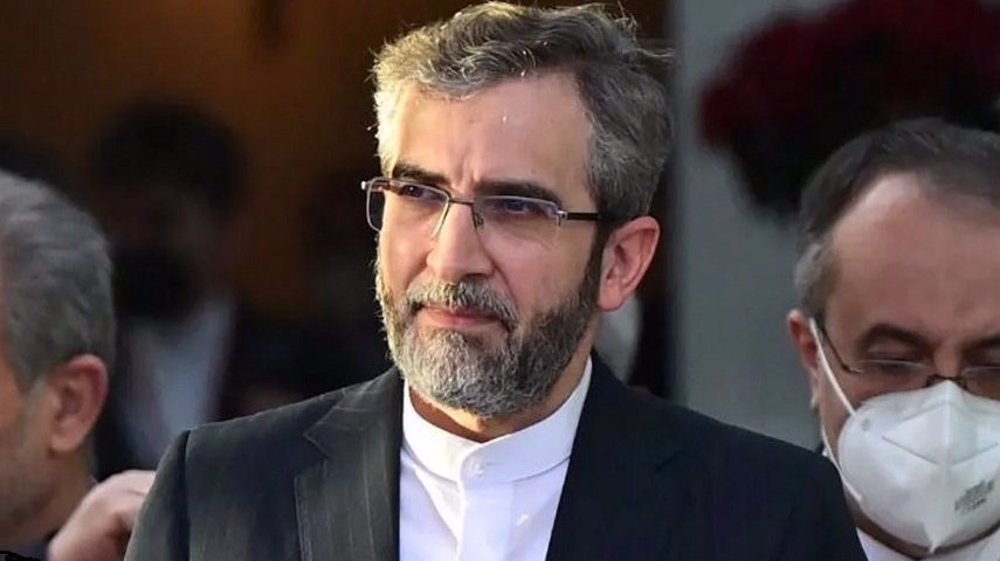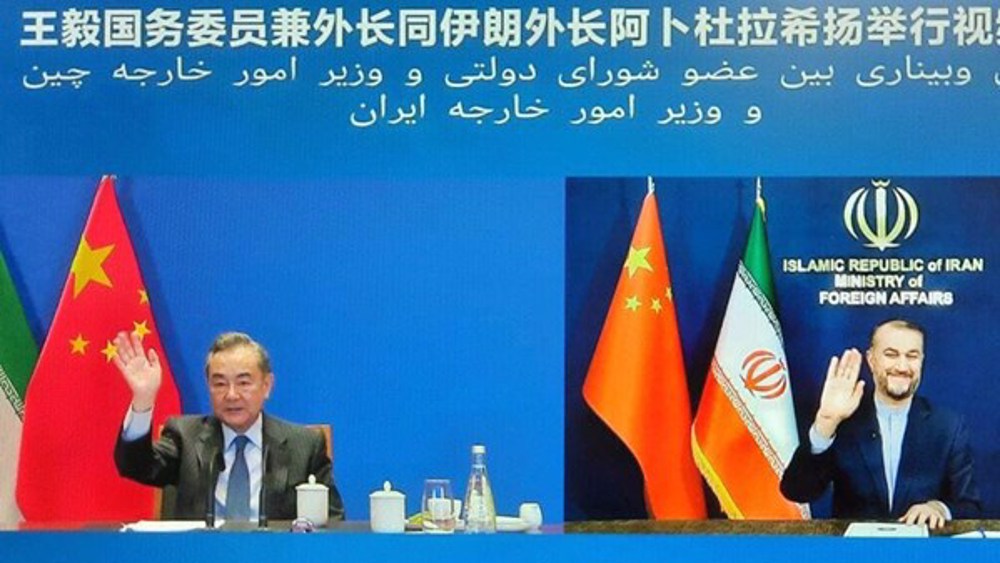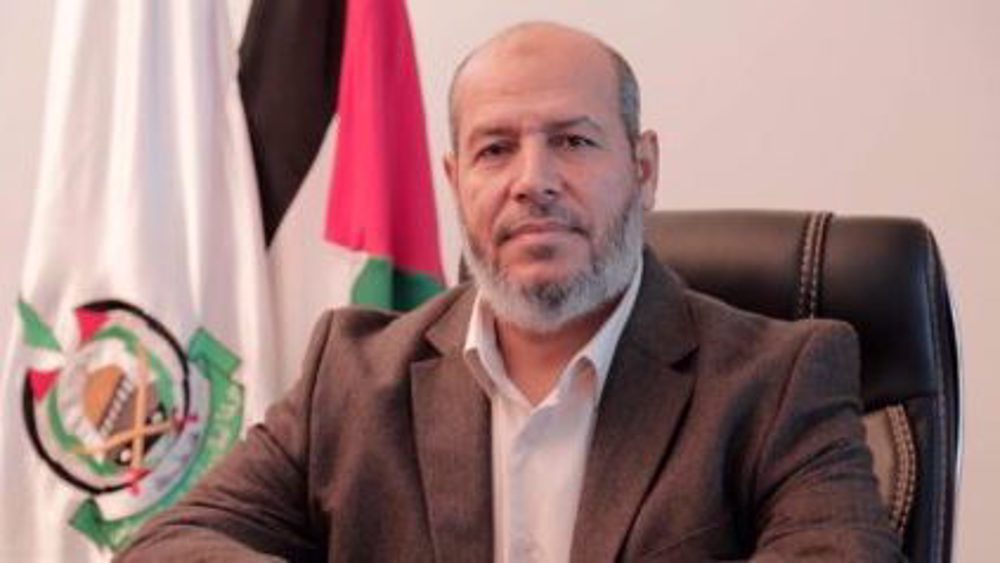China blasts US sanctions on Iran with launch of strategic partnership
China has reaffirmed its opposition to unilateral sanctions by the United States against Iran as the Chinese and Iranian foreign ministers announced the launch of a 25-year cooperation agreement aimed at strengthening economic and political ties.
Chinese Foreign Minister Wang Yi met his Iranian counterpart Hossein Amir-Abdollahian in the city of Wuxi, in Jiangsu province on Friday, with a summary of the meeting posted on China's foreign ministry website on Saturday.
Wang, who is also State Councilor, said the US bears primary responsibility for the ongoing difficulties with Iran, having unilaterally withdrawn from a 2015 nuclear deal.
The United States reimposed the sanctions that the agreement had removed and slapped new bans under different labels.
Wang said China firmly opposes unilateral sanctions against Iran, political manipulation through topics including human rights, and interference in the internal affairs of Iran and other regional countries.
"We agreed to announce today as the date to begin implementing the comprehensive agreement on strategic partnership" between Iran and China, Amir-Abdollahian said, after concluding detailed discussions on Sino-Iranian cooperation with the Chinese foreign minister in China on Friday.
Iran and China signed the landmark agreement in March last year in defiance of the US’s unilateral sanctions to strengthen long-standing economic and political alliance.
The deal officially documents the Sino-Iranian Comprehensive Strategic Partnership that had been announced during a visit by Chinese President Xi Jinping to boost economic cooperation between the two countries for the next 25 years, and paves the way for Iran’s participation in the Belt and Road Initiative, a massive infrastructure project stretching from East Asia to Europe.
Beijing has long sought to boost ties with Tehran, with President Xi describing Iran as "China's major partner in the Middle East" on a rare visit to the country in 2016.
During the Friday meeting with China's foreign minister, Amir-Abdollahian pointed to the significance of the 25-year partnership agreement signed between Tehran and Beijing and emphasized that the implementation of the document would be an important event and a fundamental change in relations.
He submitted an "important" written message by Iranian President Ebrahim Raeisi to President Xi Jinping.
Referring to the plans to commemorate the 50th anniversary of the establishment of political relations between the two countries, the Iranian foreign minister voiced Tehran's readiness to expand all-out relations with Beijing.
He hailed China's constructive cooperation with Iran in providing more than 110 million doses of coronavirus vaccines.
Iran’s foreign minister expressed hope that the opening of China's consulate general in the southern Iranian port city of Bandar Abbas would facilitate bilateral trade cooperation.
The top Iranian diplomat outlined the latest state of bilateral cooperation in various fields and said Tehran is resolved to implement all infrastructure agreements with Beijing.
He said extensive cooperation with neighbors and friendly countries in the region is among priorities of Iran's foreign policy and added that the Islamic Republic would continue to play a constructive role in regional developments, including maintaining and increasing security of energy transfer.
He also pointed to the importance of cultural relations and the common capacities of the ancient civilizations of Iran and China and said the Iranian artists' keenness to develop bilateral cooperation would be a valuable opportunity to take advantage of such a capacity.
China backs Iran’s wise stance in Vienna talks, urges US to make up for past mistake in leaving JCPOA
The Chinese foreign minister, for his part, said Beijing completely supports Iran’s wise stance toward the bullying policies of the United States and also its position on the ongoing talks with the five remaining signatories to the 2015 nuclear agreement, urging Washington to make up for the past mistake in withdrawing from the deal.
Wang said China is ready to improve bilateral cooperation in monetary, energy, banking and cultural fields despite unlawful sanctions against Tehran.
Former US President Donald Trump unilaterally withdrew Washington from the landmark nuclear deal between Iran and six world powers, officially known as the Joint Comprehensive Plan of Action (JCPOA), in May 2018 and unleashed the “toughest ever” sanctions against the Islamic Republic in defiance of global criticism. Following its much-criticized exit, Washington also prevented the remaining signatories from abiding by their commitments as per the historic agreement, which is widely viewed as a fruit of international diplomacy.
One year after Washington’s exit from the deal and the failure of the European signatories to uphold their commitments under pressure from the US, Iran took a set of retaliatory steps away from the deal in several stages in line with its legal contractual rights.
Iran and the P4+1 group of countries – Britain, France, Germany, Russia and China – resumed talks in Vienna on January 3 after the parties took a three-day break for the New Year. The US is not allowed to directly attend the talks due to its pullout. The eighth round of the Vienna talks began on December 27 with a focus on the removal of all sanctions that the United States imposed on Iran.
Iran's chief negotiator to the Vienna talks Ali Bagheri Kani said on January 8 that Iran and the five remaining signatories are resolving the outstanding issues in the Austrian capital to secure the removal of all sanctions that the United States has imposed. He added that the talks aimed at removing the sanctions are advancing and moving forward.
The Iranian and Chinese foreign ministers also discussed a wide range of political, economic, trade, consular and cultural issues as well as regional and international developments. During the second round of talks, they exchanged views about the latest developments pertaining to the sanctions removal talks in Vienna and issues in West Asia and the Persian Gulf region.
Amir-Abdollahian arrived in Beijing earlier on Friday at the head of a high-ranking political and economic delegation at the invitation of his Chinese counterpart. Speaking upon his arrival in Beijing, the Iranian foreign minister noted “very good progress” in China-Iran talks on the expansion of bilateral relations, saying “strategic issues” are being discussed between Tehran and Beijing.
“In bilateral relations, we enjoy good coordination and diversity in various issues and we have made very good progress in line with the interests of both sides,” he said, adding that “in the new government, we are facing an acceleration” in enhancing relations.
Iran, China at important consensus on comprehensive cooperation plan, Vienna talks: Amir-Abdollahian
In a Chinese post on his Twitter account, Amir-Abdollahian said that at the beginning of 2022, he was delighted to embark on his first visit to China since taking office. He added that he met with his Chinese counterpart in the “beautiful” city of Wuxi in southern Jiangsu province and exchanged views on a wide range of issues such as the comprehensive cooperation plan and the Vienna negotiations, and reached important consensus.
2022新年伊始我很高兴开启就任以来的首次访华之旅。在美丽的江苏无锡,我同中国国务委员兼外长王毅就全面合作计划、维也纳谈判等广泛议题交换了意见,达成了重要共识。中国的虎年快到了,祝两国关系在步入第二个50年之际龙腾虎跃,也预祝将在中国春节期间召开的北京冬奥会为疫情下的世界带来虎虎生机!
— H.Amirabdollahian امیرعبداللهیان (@Amirabdolahian) January 14, 2022
The top Iranian diplomat expressed hope that the Beijing Winter Olympics, which will be held during the Chinese Spring Festival, would bring vitality to the world under the coronavirus epidemic.
Hamas thanks Iran, Resistance Front following achievement of ceasefire in Gaza
'Capitulation': Israeli officials and media concede Gaza defeat as truce unfolds
'Gaza has won': Social media users react to ceasefire with mix of relief, joy
Iran seeks South Korea’s assistance for AI, fiber-optic projects
VIDEO | Iran's 'Eqtedar' (Power) maneuver
Israel hits HTS military target in Syria for 1st time since fall of Assad
VIDEO | Press TV's news headlines
Israel has slaughtered 13,000 students in Gaza, West Bank












 This makes it easy to access the Press TV website
This makes it easy to access the Press TV website